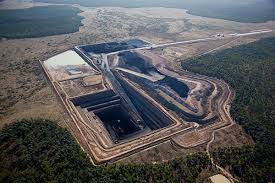The fossil fuel divide between the Abbott government and other world leaders – like US President Barack Obama – is now playing out on a domestic level, with the Queensland government this week downplaying the economic importance of the same mega-coal project Abbott & Co have described as “vital” to the state’s economy (not to mention the lives of “100 million impoverished people in India”).
The Carmichael coal mine in northern Queensland’s Galilee Basin – in which even the company behind it, India’s Adani Group, appears to be losing interest – has been a pet project of Abbott’s, who just last week told Parliament it was a vital “$20 billion investment” that would create 10,000 jobs.
And this week, federal Treasurer Joe Hockey hinted that the Coalition would consider a taxpayer-funded loan for a rail line from Abbot Point port to the coal mine, despite the entire project becoming less and less viable by the week.

“One of the things they are looking at is how we can ensure that the railway line remains financially viable. I can’t give away too many details, but we are working away at that,” Hockey told ABC radio on Monday.
As we have suggested before on RenewEconomy, this probably means that the federal government is considering tapping funds from its northern Australia infrastructure scheme, or ‘Dirty Energy Finance Corp’, announced in this year’s budget.
Queensland Treasurer Curtis Pitt would most certainly welcome this federal intervention – but in the meantime, he wants to remind everyone that the Adani coal project “is not the be-all and end-all” for the state’s economy.
While insisting he supported the Adani mine, the Courier Mail reports that Pitt said the state’s economic future did not rely only on it, and that the growth sectors of the future for Queensland would be disabilities, health and ageing.
“I am a strong advocate for the development of the Galilee,” Pitt said. “And I am going to do everything I can to accelerate that to ensure we can get the benefit of the jobs. But it is not the be-all and end-all.”
The Australia Institute has welcomed the comments as a much needed reality check, adding its own observation that Adani’s own estimates suggest the mine will create 1,400 jobs (not 10,000) – amounting to a 0.06 per cent increase to Queensland’s workforce.
“There is far too much hype around Adani’s project,” said Australia Institute director of research, Rod Campbell. “It is financially shaky and will have a marginal impact on employment and state government finances.”
Campbell added that mining, in general, would play a small part in future jobs growth in Queensland, and provided the below graph to illustrate the point.

“In the last 12 months we’ve seen mining employment decline by over 10,000 jobs, yet overall employment in Queensland is up by 15,000. Clearly mining doesn’t drive jobs in Queensland, service industries do.
“One mine alone, no matter how big, does not have a major impact on the state’s economy,” Campbell said.
“Other industries are actually creating the jobs in Queensland. Treasurer Pitt is right to warn against getting caught up in coal industry spin and to concentrate on data.”






